At last we do a long overnight train journey in China...Hong Kong to Shanghai in 19 hours. We decided on the hard sleeper option rather than soft sleeper, the difference being
there are 6 beds per cabin rather than 4, a little less comfort and privacy but the hard sleepers were half the price. The only beds left were the top bunks, which presented a few challenges to us as there was virtually no
head room so you can never sit up properly...

and they are high up so climbing required some gymnastic ability and grace that neither of us really had. The bonus was we had lots of storage room and it’s easy to sleep
up there without being disturbed as you can’t see anyone else in the carriage being in the roof of the train. Why didn’t we do this earlier? A great journey that left us looking forward to another train ride.

Shanghai
After working out the metro system and finding our hostel, we headed down to the famous Bund area only to discover that major road works and construction are underway for
the Expo in 2010, which seems to be taking over the city. There no longer is a riverside walk along the Bund to see the city’s skyline, but luckily we found one place to stop and take pictures before I started to panic,
phew.

We wandered down Nanjing Road, famous for it’s shopping where
there were lots of people milling around enjoying Golden Week, you
could feel the holiday atmosphere in the
air.

The next day we took in some of the cultural highlights Shanghai has to offer, including the site of the first Chinese Communist Party meeting in 1921 and then over to the
Shanghai Museum of History to take in many ancient sculptures, jades and calligraphy, quite riveting stuff but not enough seats for my liking, museums make my feet ache!

Then we headed over to the Pudong area to get a close up view of the Oriental Pearl TV tower,
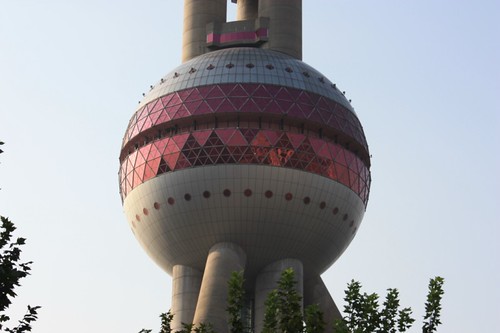
and to ascend the Jin Mao tower for the observation deck. Shanghai’s skyline is filled with skyscrapers and has a very futuristic look.

It also has a view down into the lobby of the worlds highest hotel, the Grand Hyatt. It uses the 53rd to 87th floor of the building and the view down looked like something
out of Star Wars.

And that was it for Shanghai, just a whistle stop tour to get a view of the city.

Nanjing
Next morning we headed back to the train station to travel to Nanjing and I accidently forgot to ask for hard seat tickets so we ended up in the soft seat carriage (read as
first class!!!) on a very swish and luxurious train, I could certainly get used to that kind of travel.
Nanjing used to be the capital of China, so it’s a city with lots
of history, but we were there for only one day so decided to visit the
Memorial Hall for the Nanjing Massacre.

The memorial is comprised of fantastic architecture and statues, plus a museum recounting the atrocities that took place. In the lead up to WW2 Japan invaded China and by
December 1937 they made their way to Nanjing and massacred and murdered over 300,000 people during a 6 week period as well as raping over 20,000 women.
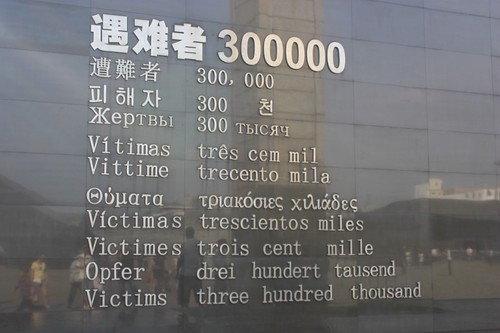
Although very informative, the museum forgets to mention that the Chinese government of the time fled Nanjing before the Japanese arrived to set up a new capital in the West
of China, locking the gates of the city wall, apart from one, making it impossible for the all the citizens to escape, resulting in the massacre...minor detail though maybe?
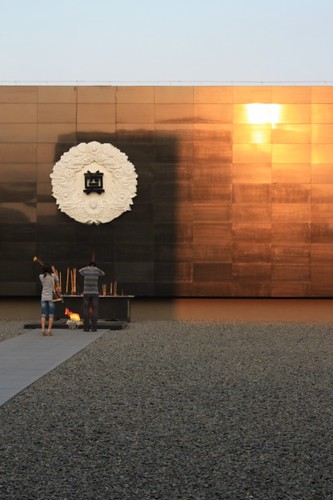
A viewing hall is built over a mass grave of the victims, which still contains the bones of people killed on that spot and you can see how each body was killed, some with
crushed skulls, some with long nails still sticking in their bones, and even one with it’s skull resting on it’s chest. Certainly one of the most disturbing places we have both visited.
Nanjing was another city enjoying the Golden Week and 60th anniversary celebrations, with the streets filled with lanterns and lights, people having fun enjoying the last
day of the holiday. We’re really glad we returned to China for the last few days rather than sitting it all out. Seeing most of the population celebrating shows a different side to a country that you don’t usually see.

When we were sitting in Nanjing train station the next day, I made a trip to the toilets but was unfortunate to witness an old lady, half naked, relieving herself all over
the bathroom floor, while three of her relatives struggled to hold her up by the arms and legs. There was obviously something seriously wrong with her as they were all shouting at her to get her attention but she didn’t
seem to be conscious. About 10 minutes later back in the waiting room, we noticed, just a few seats down from us, someone had collapsed on the floor and staff were trying to resuscitate them. It was the same old woman I had
seen and after 30 mins the paramedics turned up and pronounced her dead, she had passed away right there on the train station floor.
After that sombre experience, we caught the 18 hour train to Beijing, another sleeper but this time we had the middle bunks, which came with a little bit more room and were
not so difficult to climb into.

Half our carriage was taken by the train staff, so we got to witness a lot of men walking around in their white vests and chequered underwear, getting ready for bed after
their shift had finished, plus the women staff in uniform tops and pyjama bottoms, great looks! This also meant that when the shifts changed at midnight they made loads of noise getting ready and talking to the guys who had
just finished their shift, please shut up!!!! At one point our four cabin mates were all snoring, each at different times and speeds creating a snore chorus to lull us to sleep. Another great nights sleep and a nice lie in
too, no point in getting out of bed until we arrived at 10am! We love travelling by train and don’t want to get back on a bus!
Beijing
The first place we headed to was Tiananmen Square, which was so crowded. The area was still decorated for the huge 60th party and military parade they held on the 1st October,
with giant screens replaying the events of the day. Patriotic music piped through out the square and there were floats
on display from the parade. Everyone was buying ‘We Love China’
stickers, waving flags and looking very
happy.

Nearly as abundant as tourists were men in uniforms, both
military and police. I think it is safe to say we were being watched. We waited around to see the lowering of the
flag ceremony where all the traffic was stopped to let the guards
‘goose’ march across the road and back again all in perfect marching
unison.


Just outside Beijing is the Summer Palace, which was once the country retreat of the Ming dynasty. It’s a grand collection of temples, pavilions, living quarters, theatres
and the centre point is a temple high on a hill overlooking Kunming lake, plus a 1km long outdoor wooden walkway, known as the ‘long corridor’, decorated with intricate paintings. Everything in Beijing looks grand at the
moment as all the tourist attractions were redecorated for the Olympics, so even though the sights are impressive, it’s hard to get a sense of how ancient they really are.


We couldn’t resist a visit to see the stage of the Olympics, as we both loved watching the games. The Birds Nest stadium is a peculiar structure but striking too, although
it’s grey colour blended in well with the grey sky of the day.

The Water Cube looks cool from the outside and we took a tour inside to get up close to the structure. It’s only a shame the swimming pools are not in use for the public
but just there to view, which seems a bit of a waste.
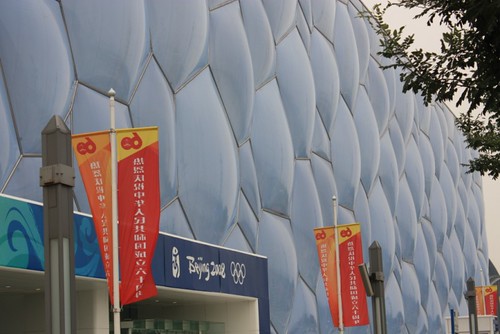
The Forbidden City takes up a large area in the centre of Beijing. It’s fronted by the Gate of Heavenly Peace, recognisable for the picture of Mao that hangs over the middle
arch.

It’s also the location of many famous speeches and declarations in China’s history. You can tour around the gate and get a good view of Tiananmen Square from the top, making it easier to appreciate the size of what is the world’s largest public square!

The Forbidden City is made up of a series of gates and temples all in a row, with courtyards around the outside containing living quarters. It does feel quite forbidden, named so as
no one was allowed to enter for 500 years unless invited, the punishment being instant death if caught doing so.


The neighbourhood we stayed in felt like a true reflection of Beijing, with a mixture of new housing and old hutongs. A Hutong is a grey walled area with narrow lanes filled
with housing, although not many remain in the city. They are a good place to enjoy the peace and quiet away from motorised transport and they are filled with bikes, there are lots of bicycles in Beijing apparently!

Beijing is a fan of big grey walls and one day we tried to visit a temple in the south of the city. We managed to find the right area but we spent an hour walking along side
a never ending, high, imposing grey wall looking for the entrance to get inside. It was so depressing trudging along, never finding a gap. Eventually we found it but it started to pour down so we just gave up defeated.

Beijing was one of our favourite places in China. Even though it’s the capital and a huge sprawling city, it’s not full of skyscrapers overpowering the landscape or shopping
malls lining every street corner, it doesn’t feel ‘westernised’ yet. The heart of the city lies in it’s history, no matter if it’s good, bad, factual or pure propaganda. It feels like a city that is really lived
in. Everywhere you go you are surrounded by portraits of Mao, large or small. For the people of Beijing, I can imagine it’s hard to escape the ways of the government or the propaganda that still exists, if recognisable.
Each underground train has televisions in the carriages showing the images from the Golden Week celebrations, they never stop showing it! Is it propaganda or is it just patriotism, it’s hard to judge but whichever it is,
it’s difficult to ignore or maybe easy to absorb. The people have a different attitude to those in the other big cities, a slightly ‘rugged’ feel to them as if they have seen and lived through many changes right there on
their doorstep, but again they are as friendly as ever.
Of course no visit to Beijing is complete without mentioning the most famous food from the area. BeiJing or Peking Duck. There are duck restaurants all over town, but we chose
one near our hostel that was full of locals all eating the duck, a good sign of quality we think, and it tasted good, so good we went back the next night for more. (Sorry duck lovers!)

We saved the best until last...
The Great Wall of China
To start with it should be renamed the Awesome Wall of China, Great doesn’t even begin to describe what you see. I think this little old wall over some rolling hills in
the backyard of China has to be one of the most impressive places I have ever been to. A ‘pinch me, am I really here?’ experience.
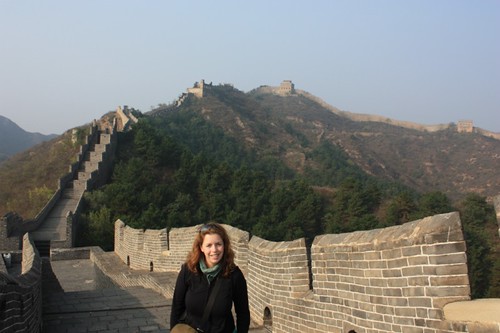
We decided to visit it on our own rather than with a tour group, and went to a quiet section of the wall, 90km outside of Beijing, where you walk 10km from Jinshanling to
Simatai. We got up at the unearthly hour of 5am to catch the first bus out of Beijing and arrived in Minyun at around 7.30am. At the bus stop we met a driver who said he could drive us to the start of the walk and pick us
up at the end and return us to the bus stop. His prices were steep so we asked how much it would be just to take us one way to Jinshanling. His reply has to be one of the best lines we have been given so far and one that we
repeat often - ’Me, I’m a two-way man’. After that classic line and still giggling, we bartered him down to a reasonable price and headed off to the wall. Our driver turned out to be a great guy, speaking some English
and offering us lots of advice and stopping at fruit stalls and supermarkets on the way so we could buy some breakfast and lunch.
The wall itself was magic.

I always thought you would have to share the wall with crowds of people, but we had it all to ourselves. There were hardly any tourists, only a handful we passed on the way
plus a few local hustlers selling drinks and postcards, but apart from that it was just us and the wall. Some sections of the wall have been repaired so are easy to walk on but other parts are in ruins and covered in rubble.
It’s very steep in places so it’s a very slow walk as you have to watch each step you take and use your hands to help get up some sections, in all a Great hike.

To be on the wall and see it curving over the hills around you and vanishing off in the distance is just remarkable. To think it was built around the 14th century and the
number of people it took to build it and who died in the process, part of the wall is said to be supported by bones of the dead!

Trying to imagine the people running up and down it each day, sending messages and looking out
for the Mongolian enemy really makes you feel like you are somewhere very special, a part of history.

When we got to the end 4 hours later, we didn’t want to leave, we wished we could have hiked it for days rather than hours,
but we had to meet up with our ’2-way man’!

And that was it for Beijing...so until next time take care of yourselves and each other ;-)
Jo & Ryan
Photos:http://www.flickr.com/photos/dojo77/collections/72157622214754286/